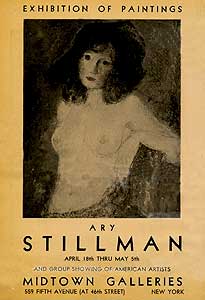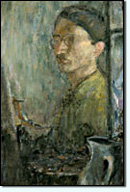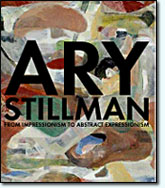"Exhibition of Paintings by Ary Stillman" at Midtown Galleries
April 18-May 5, 1934, New York

Forward
by A. D. Gruskin
Ary Stillman, born in Russia, citizen of Iowa, New York and Chicago art student, and resident of Paris and other art centers in Europe, after almost continued absence the past twelve years, returns to New York. He brings with him a group of canvases, the mature result of these years of learning and experimenting in various lands. And he returns with an extremely personal style of painting. Stillman has evolved a method of painting in which he literally models his designs out of paint, just as a sculptor works with clay. Surely and deftly he works out those low keyed harmonies that are redolent with romantic charm. This emotional content of his work is the expression of a true artist emerging from a foundation of persistent enquiry into the great art of the past. Stillman has diligently studied the various artistic philosophies that made Paris the focal point of modern art. He spent months in the little Sienese cathedrals studying the work of the Lorenzetti, Simone Martini and others. He made a thorough study of Byzantine Art. Unconsciously adopting what studied his own temperment especially., Stillman has developed his method of juxtaposing richly harmonious colors in a splendid design. This lyric approach and original treatment should bring Stillman the same recognition in this country that he has already won in Paris.
Press Clipings
"Ary Stillman, well known artist, has just returned to New York after a sojourn of twelve years in Europe, and is holding a one-man show at the Midtown Galleries, 559 Fifth Avenue; this exhibition opened April 18th and will continue through May 5th.
This is Stillman’s first exhibition in New York since his return from Paris. For most of twelve years he has been living in Germany, Italy, Palestine, France, and other parts of the world. He has studied the old masters of Italy and the new masters of Paris and has evolved an extremely personal style.
Stillman was born in Russia and at an early age settled in Iowa where he went into the jewelry business. Paralleling the great Renaissance artists, he went from his apprenticeship into the study of painting. This interest took him to New York where he studied at the National Academy. From the Academy he went to Europe where he has been for the last twelve years, except for a trip back to paint the Mexican Indians. This present exhibition of Stillman’s reveals the mature results of his years of study and work and should bring him the same recognition in this country that he has won in his many exhibitions in Paris. He had one-man exhibitions at the Gallerie Zak and at the Gallerie Bernheim Jeune in Paris and has exhibited in all the important group shows held there."
The Official Metropolitan Guide
New York
April 1934
"Stillman has developed a style of singular sensitiveness and charm. Avoiding alike the sharp edges or heavy outline so much in evidence in the work around him, he conceives his volumes in mass and as intimately related to their surroundings. As he has a feeling for tone and subtly modulated color, his canvases take on an air of meditative aloofness that invests even commonplace accessories with a touch of distinction. Whether dealing with a kitchen interior or a nude, or with one of his various portraits, he reveals a distinct and alluring personality."
The New York Sun
April 26, 1934
"Ary Stillman, whose paintings are being exhibited at the Midtown Gallery, also recalls the French Impressionists. But only if you can imagine them with a dash of Old Master will you have Stillman. His work has a charm, a lyricism, a luminosity, which are most exciting. One piece in particular, “Interior, Kitchen” is a marvel of beautiful lighting. His pieces make use of rich, velvety blacks, glowing blues, poignant greys."
The New York World Telegram
April 21, 1934
" …He traveled through Spain, Italy and France, looked at and studied the Primitives, the painters and tapestry makers of the early Renaissance and the pre-Renaissance period. From these painters and tapestry makers and from the Japanese print-makers, he extracted the elements of his own art and sought with this knowledge to create something which would have the impress of his own emotions, his own personality…
For 12 years he lived, studied and toiled abroad, until he had achieved an approximation to his goal, which was to transfer onto canvas the personal vision of Ary Stillman in the personal technique to which he had struggled, but informed with the knowledge he had gained from the study of those masters of the past to whom he had spiritual kinship.
His problems included the problem of making the colors on the flat canvas suggest depth and contour, so that the objects would seem to grow out of the canvas. His problems also included the one of extracting all the wealth and the richness and the color out of a limited palette, a palette limited entirely to earth colors."
" ….I realized as I looked at these pictures that here was a fresh talent and as I looked I felt that this Stillman painted as if he had crushed gems into concrete and put that strange, though solid, mixture on his canvas in lieu of paint."
Jewish Daily Bulletin
New York City
April 1934
How One Artist Developed Originality
"...In the catalogue notes, Mr. Stillman says that he, as so many other artists in Europe, was a 'hero-worshiper' following in the camp of this artist, who came into prominence from time ti time. Then tiring of spending his days 'discussing theories and endeavoring to intellectualize the emotional' along with other 'camp followers,' he began a thoroughstudy of the old masters and became particulary interested and impressed by the 'spiritual force emanates' from the work of the Sienese artists. 'The greatest factor, I found,' says Mr.Stillman, 'which evolves from continuous close contact with great works of art, is that our vision is purified. We get to be less conscious of the vulgarity of things. Even the ugly becomes surrounded by a certain charm.'
Although he works in a low-keyed palette, the juxtaposition of his colors is richly harmonious and, as Marcel Sauvage, French art critic, has pointed out, makes 'one think of tapestries and precious jewels. The richness of the coloring is quite personel.'"
The Art Digest
May 1, 1934
Exhibited Artwork Titles:
In The Studio (Nude and the Artist), Portrait of Mrs. C., Mlle. Andree, Still Life, Portrait of Peggy, Spanish Girl, Ava, Portrait, Interior Kitchen, Marianna, Interior, Composition, Margaret, Catharine, Old Court, Sarah, Italian Landscape, San Gemignano, Beatrice, Courtyard at Senlis.





